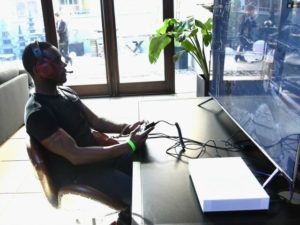Improve Internet Gaming Disorder with Mindfulness
By John M. de Castro, Ph.D.
“The conclusion to draw here is that though substances like cocaine are very effective at triggering changes in the brain that lead to addictive behavior and urges, they are not the only possible triggers: just about any deeply pleasurable activity — sex, eating, Internet use — has the potential to become addictive and destructive.” – Howard Markel
There are many addictions, from exercise, to alcohol, to sex, to drugs, to gambling, to cigarettes. There are a number of differences produced by the specific nature of each addiction. But, there are also some general features. The core components of addiction include an enhanced incentive for the activity or substance (craving), impaired self-control (impulsivity and compulsivity), emotional dysregulation (negative mood) and increased reactivity to stress. Mindfulness training has been shown to be helpful with each of these components, decreasing cravings, impulsiveness, and psychological and physiological responses to stress, and increasing emotion regulation. It is no wonder then that mindfulness training has been found to be effective for the treatment of a variety of addictions.
Video game addictions are very common. It is estimated that 72% of American households play some form of video games, with the average use of 20 hours per week. About 9% show signs of addiction to video games while 4% were classified as extreme players who played 50 hours per week or more. The consequences of video game addiction range from “impaired physical health, such as being overweight or obese due to lack of physical activity, sleep disorders, and heightened risk for seizures, depressive and somatic symptoms, social anxiety, and attention-deficit/hyperactivity disorder, substance misuse, driving while playing video games, suicidal ideation, hostility, violence, loss of relationships and employment, and financial debt.”
There is thus a need to find safe and effective treatments for gaming addiction that not only help stop the addiction but also prevent relapse. In today’s Research News article “Mindfulness-Oriented Recovery Enhancement for Internet Gaming Disorder in U.S. Adults: A Stage I Randomized Controlled Trial.” (See summary below) Li and colleagues study the ability of mindfulness practices to treat gaming addiction. They recruited adults who met the requirements for clinical diagnosis of Internet Gaming Disorder and randomly assigned them to 8 weekly 2-hour group sessions of a support group or of Mindfulness-Oriented Enhancement (MORE). The treatment integrates training in mindfulness, cognitive reappraisal skills, and savoring natural rewards. MORE is designed to modify automatic behavioral habits and pleasure dysregulation associated with addictive behaviors. The participants are requested to continue mindfulness practices at home. The participants were measured before and after the 8-week treatment period and were followed-up 3-months later for internet gaming addiction, craving, maladaptive thoughts, mental distress, coping strategies, and mindfulness.
They found that both groups showed improvement in internet gaming addiction measures, but the Mindfulness-Oriented Enhancement (MORE) group showed significantly greater improvement than the support group, particularly at the 3-month follow-up. They also found that both groups showed reductions in craving, distraction, catastrophizing, loneliness, and depression, and improved impulse control, acceptance and socialization, but the MORE group showed significantly greater improvement than the support group in craving, loneliness, and depression, particularly at the 3-month follow-up.
These exciting results suggest that both a support group and a mindfulness based addition treatment program produced significant improvements in internet gaming addiction. But, the mindfulness treatment produced superior results for improving internet gaming along with reducing cravings for gaming, and improving mood. This was true particularly at the 3-month follow-up suggesting that the mindfulness based addition treatment program produces more long-lasting benefits. This further suggests that MORE may also be superior at preventing relapse.
The results add to the list of addictions that can be successfully treated with mindfulness practices. With the number of people engaged in internet gaming and the huge number who become addicted, it is heartening to see that a mindfulness based addition treatment program can be safe and effective, relieving addiction and cravings and improving mood.
So, improve internet gaming disorder with mindfulness.
“mindfulness can play an important role in ameliorating problem gambling symptomatology.” – Mark Griffiths
CMCS – Center for Mindfulness and Contemplative Studies
This and other Contemplative Studies posts are a also available on Google+ https://plus.google.com/106784388191201299496/posts and on Twitter @MindfulResearch
Study Summary
Li, W., Garland, E. L., McGovern, P., O’Brien, J. E., Tronnier, C., & Howard, M. O. (2017, April 24). Mindfulness-Oriented Recovery Enhancement for Internet Gaming Disorder in U.S. Adults: A Stage I Randomized Controlled Trial. Psychology of Addictive Behaviors. Advance online publication. http://dx.doi.org/10.1037/adb0000269
Abstract
Empirical studies have identified increasing rates of Internet gaming disorder (IGD) and associated adverse consequences. However, very few evidence-based interventions have been evaluated for IGD or problematic video gaming behaviors. This study evaluated Mindfulness-Oriented Recovery Enhancement (MORE) as a treatment for IGD. Thirty adults (Mage 25.0, SD 5.4) with IGD or problematic video gaming behaviors were randomized to 8 weeks of group-based MORE or 8 weeks of a support group (SG) control condition. Outcome measures were administered at pre- and posttreatment and 3-months following treatment completion using self-report instruments. Linear mixed models were used for outcome analyses. MORE participants had significantly greater reductions in the number of Diagnostic and Statistical Manual of Mental Disorders–5 IGD criteria they met, craving for video gaming, and maladaptive cognitions associated with gaming than SG participants, and therapeutic benefits were maintained at 3-month follow-up. MORE is a promising treatment approach for IGD.
